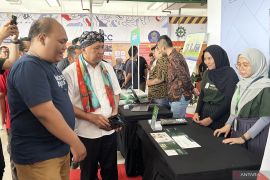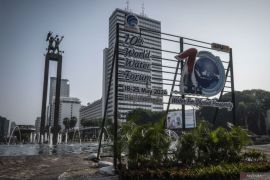"Right now, we need an immediate solution to the current account deficit. The government will overcome the deficit by reducing imports, particularly fuel oils," Chief Economic Minister Hatta Rajasa said.Jakarta (ANTARA News) - Indonesia is taking steps to reduce its fuels imports and promote the use of biofuels at home in response to its current account deficit and the depreciation of its rupaih currency against the US dollar.
Besides cutting oil and gas imports, the Indonesian government, through a package of economic policies it announced last weekend, is also boosting its exports to help cover its deficit.
"Right now, we need an immediate solution to the current account deficit. The government will overcome the deficit by reducing imports, particularly fuel oils," Chief Economic Minister Hatta Rajasa told a press conference on Monday.
Seasonal external and internal factors as well as falling prices of export commodities overseas have been believed to contribute to widening of the current account deficit from US$5.8 billion or 2.6 percent of the country`s GDP in the first quarter this year to US$9.8 billion in the second quarter or 4.4 percent of the GDP.
Observers have also predicted that unless preventive measures are taken, the rupiah exchange value could reach Rp12,000 per US dollar. Until Friday morning, for example, the exchange rate had stood at 11,035 rupiah for one US dollar, meaning that the value of the rupiah had decreased by 175 points.
Economic observer Sri Adiningsih of the Gajah Mada University has even predicted that Indonesia`s rupiah currency would continue to weaken and has the potential to be devalued to Rp12,000 per US dollar.
"I predict the rupiah will continue to weaken. It could fall to Rp12,000 per US dollar if we are not careful," Sri Adiningsih said.
Therefore, the government on Friday announced its economic policy packages which outlined four steps to be taken in response to the country`s latest economic conditions.
Hatta said that the government will boost exports by reducing taxes for companies that export 30 percent of their products abroad, reduce oil and gas imports by boosting the usage of biodiesel, increase taxes for luxury goods from 75 percent to 125-150 percent while increasing the production of minerals.
Apart from maintaining the value of the rupiah against the US dollar, the government also plans to maintain fiscal deficit value at 2.38 percent and maintain people`s purchasing power and inflation rate.
"The current deficit is mostly contributed to by oil imports. Overall, we still record a surplus in oil and gas trade," Hatta said.
Indonesia currently imports an estimated 35 million kiloliters of diesel oil per year, including 17.5 million kiloliters for subsidized diesel oil, he said.
To reduce diesel oil consumption, the government would make it mandatory for the public to use crude palm oil-based bio-fuel, he said.
"Our CPO production is currently on the rise, while on the other hand, the CPO price in the market is declining. Therefore, we must protect our palm oil entrepreneurs and farmers to continuously get their product to market," he said.
"The price of CPO-based biofuel is lower than that of imported diesel oil," he noted.
Hatta Rajasa predicts the increasing use of biodiesel will reduce oil imports.
"We will reduce the burden on oil and gas imports, expand the domestic market and strengthen public forestry efforts that can improve the use of biofuels," he said after a coordinating meeting with the Indonesian Biofuel Producers Association.
The installed capacity of the business world in the country today is 5.67 million kiloliters, and there will be an additional amount of about three million kiloliters, along with 3.14 million kiloliters, as called for in future plans.
The association members said they are ready to meet the mandatory requirements of 10 percent biodiesel use from the Public Service Obligation (PSO) and non-PSO diesel use, which is currently the overall percentage of diesel fuel being consumed per year, in a bid to reach 35 million kiloliters.
"The business world is ready to supply biodiesel, and this mandatory order is not only being applied to PSO, but also non-PSOs that provide biodiesel for large mining industries and other industries that use diesel fuel," he said.
Earlier, the Indonesian Chamber of Commerce and Industry (Kadin) has urged the government to overcome the country`s high trade deficit so that it will not affect the national economy.
"The problem must be resolved soon before it has a far-reaching effect on the national economy," Kadin deputy chairman for banking and financial affairs, Rosan P. Roeslani said.
Indonesia recorded a trade deficit of US$3.3 billion in the first quarter of 2013. The figure is expected to increase to US$6 billion at the end of this year. The deficit was triggered by high import of oil and auxiliary materials and low export of national commodities.
To curb the deficit, he said the government must be able to control the high import of oil and auxiliary materials while at the same time raising the export of national commodities.
In order to boost exports the government imposed a tax cut incentive for labor-intensive industries. The tax cut incentive will be given to companies that export 30 percent of their products abroad.
The tax cut incentive is expected to boost exports.
However, economist Enny Sri Hartati of the Institute for Development of Economics and Finance (Indef) said the tax incentive given by the government to labor-intensive industries is not the right solution to the industry`s problems.
"The tax cut incentive offered by the government to labor-intensive industries will not accomplish its objective. It is not the right solution," she said.
She added that what was needed by industries was access to financing sources, lower interest rates and other forms of incentives, rather than a tax cut.
Chairman of the Indonesian Employers Association (Apindo) Anton Supit said the government`s tax cut incentive had no relevance to the problems faced by labor-intensive companies.
"The problem is that our products no longer compete because our labor costs have reached about 30 percent of the selling price," Anton said.
The industries needed a clear regulation on labor affairs to overcome the problem, not a tax cut incentive.
He noted that Apindo`s products could serve as an example, such as footware and garments. These industries have total exports of US$20 billion and employ about four million workers.
"What is needed now is a way to reduce labor costs without sacrificing workers. This is more important. So, we should not be offered a solution with a tax cut, because if we suffer from losses, we, in reality, do not pay taxes," he said.
"Of course we thank the government for the tax cut measure, but if it is said that this policy offers an answer to the problems, I think it is not true," Anton said.
In the meantime, a legislator said the government`s package of economic policies should have been adopted long ago to prevent unfavorable economic conditions.
"The steps as formulated in the economic policy package should have been taken during the first year of the president`s first term in 2009," Harry Ashar Azis, the deputy chairman of the House of Representatives (DPR)`s Commission XI on financial affairs, said.
But Hatta believed the recently announced package of economic policies, if implemented properly, would reduce the current account deficit to below three percent in the third quarter of this year.
"We believe the current account deficit which is now 4.4 percent of the gross domestic product (GDP), will drop below three percent in the third quarter," Hatta said. (*)
Reporter: Andi Abdussalam
Editor: Heru Purwanto
Copyright © ANTARA 2013











